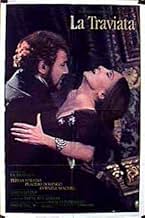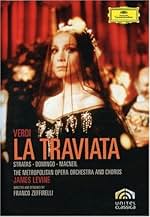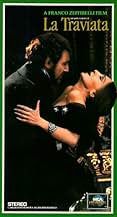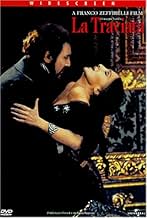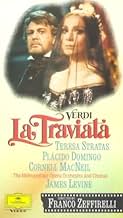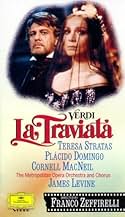PUNTUACIÓN EN IMDb
7,6/10
1,5 mil
TU PUNTUACIÓN
Violeta y Alfredo están enamorados pero Giorgio, el padre de él, prohíbe la unión creyendo que la mala reputación de Violeta afectará las oportunidades de la hermana de Alfredo.Violeta y Alfredo están enamorados pero Giorgio, el padre de él, prohíbe la unión creyendo que la mala reputación de Violeta afectará las oportunidades de la hermana de Alfredo.Violeta y Alfredo están enamorados pero Giorgio, el padre de él, prohíbe la unión creyendo que la mala reputación de Violeta afectará las oportunidades de la hermana de Alfredo.
- Nominado para 2 premios Óscar
- 6 premios y 5 nominaciones en total
Ariel Bybee
- The Voices of
- (doblaje en canto)
Geraldine Decker
- The Voices of
- (doblaje en canto)
Ferruccio Furlanetto
- The Voices of
- (doblaje en canto)
Russell Christopher
- The Voices of
- (doblaje en canto)
Michael Best
- The Voices of
- (doblaje en canto)
Argumento
¿Sabías que...?
- CuriosidadesItalian censorship visa # 78579 delivered on 17 February 1983.
- Banda sonoraLa Traviata
Written by Giuseppe Verdi
Libretto by Francesco Maria Piave
Performed by the cast of this film and The Metropolitan Opera Orchestra and Chorus
Directed by James Levine
Reseña destacada
A path of education...
Art of high achievement influences many eternally and profoundly. Maybe he was not as accomplished as his good old dad, Alexandra Dumas Fils made his own work a classic household name which is well-remembered and appreciated.
I first heard about "Cha Fa Nui" (Camille) from the mouth of my mother when I was still an upper primary school girl. To a young Chinese girl, this meant nothing at all but I went to the public library and found that there were many copies with this title translated by Taiwanese. I never finished reading it because the names are too long and the Chinese is too literary, I was bored to death by it. The only thing I remembered was that it was a French novel. Dropped, the book, but not the name.
A few years later in the early 80's, Franco Zeffirelli's operatic movie with Chinese title as "Cha Fa Nui" was on show in one and only one movie house, "Palace" at Causeway Bay (demolished!). At that time, this prestigious cinema showed mostly western movies of big names like Gone with the Wind, Casablanca, Dr. Zhivago and so "La Traviata" was one of them.
Hong Kong Chinese were then not very familiar with Western culture, the cinema staff had even misplaced Plácido Domingo's name as "Domingo Plácido" on the billboard. I, as a teenager, was a little intimidated by the movie house by its reputation and grandeur. Yet, out of curiosity, in those fearless, carefree and innocent days, imitating the adults with good taste, I bought a ticket to see this movie. And it was a WOW, what an eye-opening experience!
The vision, the music, the powerful opera singing, the acting and the poetic cinematography, the wondrous costumes and hairdo, it was an educational adventure to a young life. (So, until now I still don't understand how come the man at one row before me could be sleeping and snoring so annoyingly while his girlfriend/wife/sister was staring hard on the screen without moving her head.) Everything is unforgettable about this movie. The happy time of the lovers that Violetta once fell off into a shallow brook from the narrow wood plank. The histrionic and comical fit of Alfredo when he was struggle to open that fateful letter from Violetta. And the most excruciating of all, I can still feel the deafening horror that the deserted and seriously ill Violetta was standing desertedly in the cruelly empty and stripped big house, letting out piercing shriek of pain.
The subsequent episode is an educational search for me: I looked for abridged version of "Cha Fa Nui" in English "Camille" and found out that the names of the original protagonists were Marguerite Gautier and Armand Duval but not those in the operatic adaptation as Violetta Valery and Alfredo Germont. Furthermore, the book inspired Giuseppe Verdi first to make it into an opera but not Franco Zeffirelli's movie.
And five years later, I learned some French and so, dared to touched the original "La Dame aux Camélias". Later, I learnt from an Italian lady that the name of Verdi's opera "La Traviata" was derived from an Italian verb "traviare" which means "to mislead", "to lead astray", or "to corrupt". Thus, a "corrupted man" is a "traviato" and so "the fallen woman" or "the corrupted woman" is "La Traviata". And the book has inspired every generation's film-makers or TV producers, so far there are more than forty adaptations. Well, well, well, what a job all through the years.
What's more interesting, I once read from an oddly-enough page about the Brits' Prince Charles. It is reported that his favourite opera is "La Traviata", and my eyebrows arched. Of course, his loved one is named "Camilla", and strictly speaking by royal standard, she is a "fallen" (committed adultery + divorced) woman.
Art of high achievement influences many eternally and profoundly. Maybe he was not as accomplished as his good old dad, Alexandra Dumas Fils made his own work a classic household name which is well-remembered and appreciated.
I first heard about "Cha Fa Nui" (Camille) from the mouth of my mother when I was still an upper primary school girl. To a young Chinese girl, this meant nothing at all but I went to the public library and found that there were many copies with this title translated by Taiwanese. I never finished reading it because the names are too long and the Chinese is too literary, I was bored to death by it. The only thing I remembered was that it was a French novel. Dropped, the book, but not the name.
A few years later in the early 80's, Franco Zeffirelli's operatic movie with Chinese title as "Cha Fa Nui" was on show in one and only one movie house, "Palace" at Causeway Bay (demolished!). At that time, this prestigious cinema showed mostly western movies of big names like Gone with the Wind, Casablanca, Dr. Zhivago and so "La Traviata" was one of them.
Hong Kong Chinese were then not very familiar with Western culture, the cinema staff had even misplaced Plácido Domingo's name as "Domingo Plácido" on the billboard. I, as a teenager, was a little intimidated by the movie house by its reputation and grandeur. Yet, out of curiosity, in those fearless, carefree and innocent days, imitating the adults with good taste, I bought a ticket to see this movie. And it was a WOW, what an eye-opening experience!
The vision, the music, the powerful opera singing, the acting and the poetic cinematography, the wondrous costumes and hairdo, it was an educational adventure to a young life. (So, until now I still don't understand how come the man at one row before me could be sleeping and snoring so annoyingly while his girlfriend/wife/sister was staring hard on the screen without moving her head.) Everything is unforgettable about this movie. The happy time of the lovers that Violetta once fell off into a shallow brook from the narrow wood plank. The histrionic and comical fit of Alfredo when he was struggle to open that fateful letter from Violetta. And the most excruciating of all, I can still feel the deafening horror that the deserted and seriously ill Violetta was standing desertedly in the cruelly empty and stripped big house, letting out piercing shriek of pain.
The subsequent episode is an educational search for me: I looked for abridged version of "Cha Fa Nui" in English "Camille" and found out that the names of the original protagonists were Marguerite Gautier and Armand Duval but not those in the operatic adaptation as Violetta Valery and Alfredo Germont. Furthermore, the book inspired Giuseppe Verdi first to make it into an opera but not Franco Zeffirelli's movie.
And five years later, I learned some French and so, dared to touched the original "La Dame aux Camélias". Later, I learnt from an Italian lady that the name of Verdi's opera "La Traviata" was derived from an Italian verb "traviare" which means "to mislead", "to lead astray", or "to corrupt". Thus, a "corrupted man" is a "traviato" and so "the fallen woman" or "the corrupted woman" is "La Traviata". And the book has inspired every generation's film-makers or TV producers, so far there are more than forty adaptations. Well, well, well, what a job all through the years.
What's more interesting, I once read from an oddly-enough page about the Brits' Prince Charles. It is reported that his favourite opera is "La Traviata", and my eyebrows arched. Of course, his loved one is named "Camilla", and strictly speaking by royal standard, she is a "fallen" (committed adultery + divorced) woman.
- shu-fen
- 7 abr 2004
- Enlace permanente
Selecciones populares
Inicia sesión para calificar y añadir a tu lista para recibir recomendaciones personalizadas
- How long is La Traviata?Con tecnología de Alexa
Detalles
Taquilla
- Recaudación en Estados Unidos y Canadá
- 3.783.329 US$
- Recaudación en todo el mundo
- 3.783.329 US$
Contribuir a esta página
Sugerir un cambio o añadir el contenido que falta



